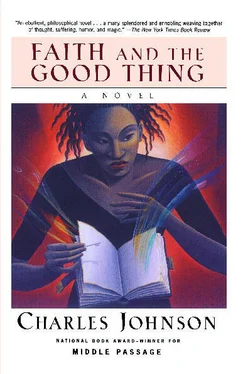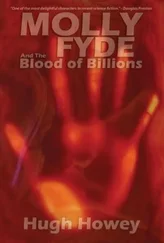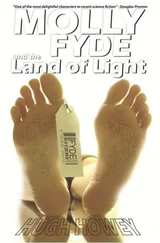It shot from her lips: “The Good Thing.”
Tippis stared, then chuckled, lighting a fresh cigarette, his tenth. “There is no such object. Surely you mean some specific thing that makes you feel good — like scratching, sneezing, or the pleasurable feeling when the valve to your full bladder opens—”
“No, I mean—” She stopped, her eyes wide with incredulity. She stared past him to the wall. What did she mean?
“You’re in serious trouble if you have a drive for which there’s no object. That’s what the world is really all about — subject-object antagonism. Objectifying a thing, making it no more than an object so it can be grasped, manipulated, and ruled is, obviously, dehumanizing, even cruel, I suppose, if done to another person. But too many of your drives can only be satisfied, and only then temporarily, in this way. There is no other way unless you kill off your feelings like a musty old monk or Indian bodhisattva. So find an object. The world provides several, and they’re useful and approved besides. Set an accepted goal for yourself — comfortable living, that’s a good one, or fashion, collecting antique bottles or comic books from World War II. Sublimate, child.” He looked at her over the rims of his glasses and smiled. “Do you like cuisine?”
“I don’t know,” Faith said. “Isn’t that what they clean in the army?”
“That’s latrine,” Tippis snorted. He waved his hand dramatically, then lowered it, stroking her wrist. “You can’t escape history, or the needs and neuroses you’ve picked up like layers and layers of tartar on your teeth (Pardon me, I couldn’t resist that, dentistry and all).” He laughed deeply, “Mhah ha ha ha,” amusing himself. “Your every past action and thought have made you what you are. Am I right or wrong?”
His words troubled Faith. The past, remote and distorted by the mercy of waning memories, had the terrible power to be present at all times in its effects: this was true. It was some kind of law. Didn’t sorcerers control their victims by possessing an old truss they’d worn, old cigarette butts that once touched their lips? And Dr. Lynch — wasn’t what he meant — that what was, was only the form of what had been, even if what was past had been accidental? In their corner of the bar, Faith tried to make her peace with the problems of change, permanence, and the free-will-destroying tyranny of history. Everything, including the Good Thing, seemed to hinge on it. But you couldn’t have it both ways — change and no change, freedom and the comfort of the past. Either you were brand-new at each instant, innocent and undetermined and, therefore, free, or you were a bent-back drudge hauling all of world history on your shoulders across the landscape of your life, limited in all your possibilities, enclosed within the small cage of what had passed before. Each event would weigh you down, alter you, send you through endless changes. You were in bondage. And the other way? — could you be brand-new each instant, remade by the power of either your own hand or magical thoughts? She turned it over and over: the Good Thing, if it could be at all, if it was indeed the truly unique good thing, had to be in the second way, above and beyond the wastepaper basket of the past; but didn’t that imply that it, being so aloft, so absolute, was not really in the world — that the slim line between perfection and impossibility was no distinction at all? It was all so confusing. Her thoughts became sluggish and lost their connections. Tippis’s voice drifted back again, breaking the mood.
“. am I right or wrong?”
“That’s so grim. ” she wanted to say, but her tongue, heavy as lead, would not move.
“It’s the same for everybody,” Tippis sighed through his teeth. “Civilized life is based on suffering, on the enslavement of the instincts and the self-alienation implicit in never being an object for your own needs. Look at this.” He released her hand and unfolded a paper napkin upon which he made a hasty sketch:

“That’s what should happen,” Tippis said. “The instinctual drive is directed from the pleasure to the reality principles by a secondary process that points it head-on at the world. But it meets an anticathexis, and gets displaced this way:

“. so the libidinal energy of the instinct itself feeds the neurosis.” Tippis stared at his sketch and groaned. “That’s me, Arnold Tyler Tippis! All I ever wanted was to be a musician, but that little arrow there got bent all to hell!”
“Tha’s. turrble,” Faith said. “You wanted to be a moosician?”
Pain sprang across Tippis’s face. His eyes seemed to swell like blowfish behind his lenses, and he shook his head violently. “I’m over that now. It doesn’t bother me anymore. I can even laugh about it. ”
Faith did not hear him laugh.
“My parents were killed in a highway accident when I was a child, so I grew up in a little Midwestern town with my aunt and uncle. I called him Uncle Bud, and he played a banjo like nobody’s business — he taught me chords and transitions, the whole works. Naturally, I wanted to be a traveling musician, he being my ego-ideal and all. But my aunt wouldn’t hear of it.” Tippis’s eyes moistened with remembrance. “She used to beat my fingers with a poker whenever she caught me playing Uncle Bud’s banjo after he died.” Tippis placed his cigarette in the ashtray to his left. Faith realized that his right index and forefinger remained outstretched and rigid though his hand was empty. Tippis held his right hand up, staring at his fingers with ill-suppressed horror:
“She broke those two once. They never did come back exactly right. But she had my best interests at heart — I know that now. So,” he sighed, “I couldn’t fret Uncle Bud’s banjo anymore. About the only thing I could do after that was read. I graduated from college when I was nineteen. ”
“And the fingers didn’t heal?” Faith asked.
“Nope.” Tippis glanced over his shoulder, then shoved his right hand into his pocket. “Like I said, it used to bother me. I couldn’t date girls or anything like that for a long time. I felt too self-conscious.” He peeked at her over his lenses again. “You do understand, don’t you?”
“I’m sorry,” Faith said.
“But that’s okay, just as long as clever girls like you can stay on the streets the object I need is provided. You ready to go?”
Though she knew not where and could hardly stand, Faith said, “Yes,” feeling inside and out all toasted, tight-chested, and trusting. He, this somehow sad and pitiable man dirty with the dust of his memories, supported her on his right arm, led her back onto the cold, empty street, and hailed a taxi. At Stony Island he took her to an old building bearing a sign out front — HOTEL SINCLAIR — a place so small its cockroaches had to walk single-file through the hallways. A stocky woman at the desk startled awake when they entered and studied Faith apprehensively before shoving Tippis the ledger and asking, “How old is she?” Tippis grunted, “Twenty-six,” and the woman handed him the key, grumbling, “No drinking — I run a decent place here, Mr. and Mrs. Taylor,” the last part of that being malevolent and as dry as witches’ ashes on a Puritan’s pyre. “Mrs. Taylor?” Faith said. Tippis ignored that and led her up a narrow, creaking flight of stairs to a dingy room at the end of the fourth floor. He closed the door and, in the darkness, dropped Faith across a mattress moist at its center. He stepped farther back into the shadows.
Читать дальше














